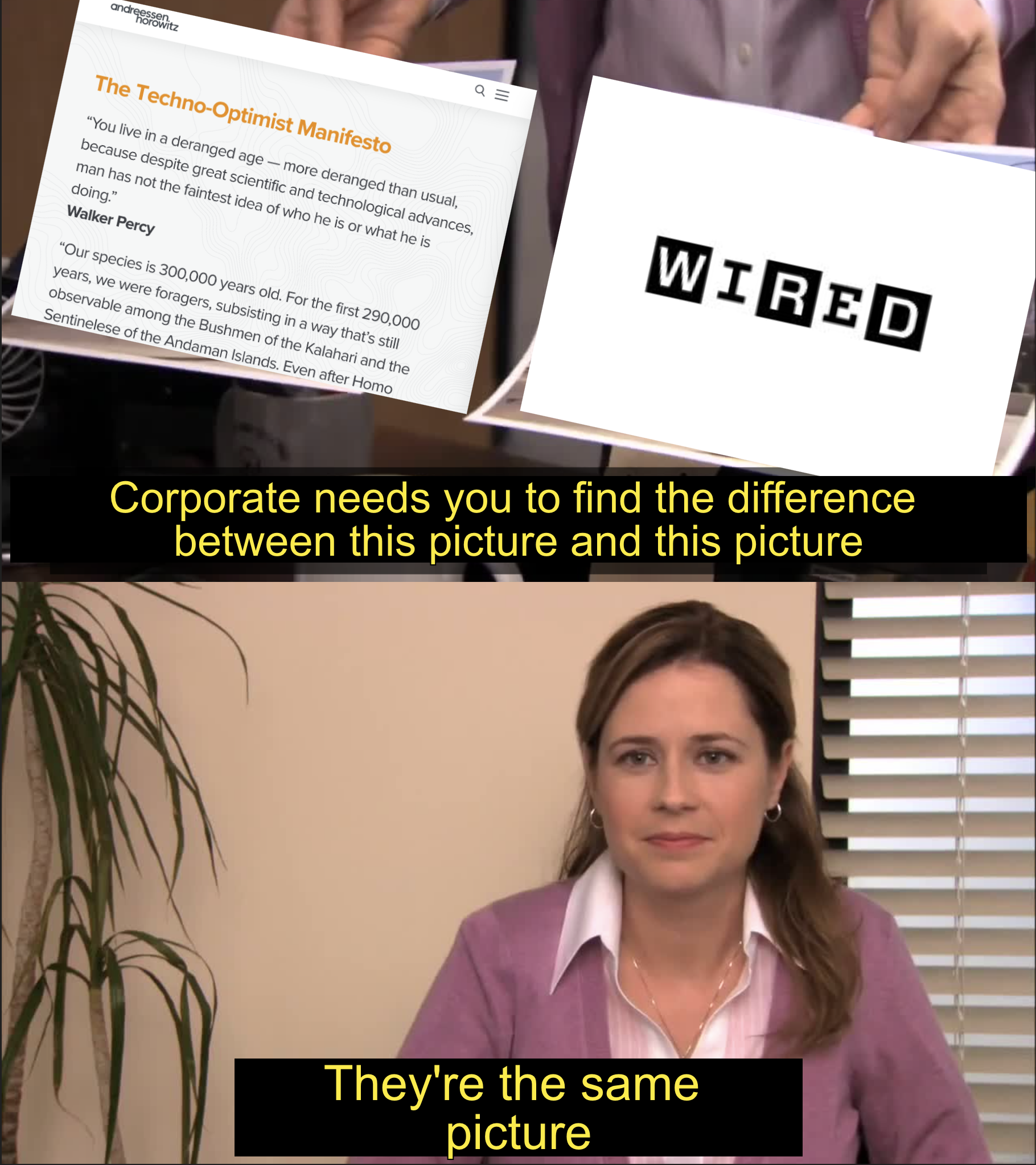This essay was originally was published on October 19, 2023, with the email subject line "CT No. 189: Meal prep strategies for sustaining consistent content."
Apologies to our readers outside the US — the following is specific to American culture, but I'm assuming it might spill into your country's tech and media industries as well.
Recent internet discourse has been churning out babble on both ends, declaring our current state of platform-driven internet and the rise of artificial intelligence to be either a massive opportunity for growth or irrevocably horrible and beyond repair. I have minimal tolerance for takes on either side, since they tend to be produced by myopic men who spend their days pontificating online instead of conversing, screen-free, with other people.
Andreessen's techno-optimism memo, nigh unreadable and dripping with the folk-economics Babbittry of his Midwestern upbringing, clashes once again with the east coast media industry's tired insistence that they are being robbed of their influence without warning. Some other dude brings up Wired, and no one prominent discusses what properly managing networked communications look like at a practical level, even though there are plenty of examples of what good looks like that have existed for years. (I recommend the excellent Everything in Moderation newsletter if you want to learn how actual people are working hard to keep the internet tolerable with laws, policies, and yes, more software.)
... Most reporters and editors covering big tech regularly demonstrate that they have no idea of how the software itself actually works.
Wired, for its part, retracted an opinion piece earlier this month about Google's "manipulation" of search results that revealed its editors didn't know what "phrase match" keywords are or that paid search algorithms are different from organic search results. As the most prominent legacy publication covering tech, Wired's retraction was extremely embarrassing and indicative of the fact that most reporters and editors covering big tech regularly demonstrate that they have no idea of how the software itself actually works, even when that information is easy to find online, and thousands of developers and marketers would be happy to describe it in detail. It's a problem, and it means we're always keeping the discourse at the level of "will we live in space?" instead of something, anything more useful.
Neither Andreessen and his Silicon ilk nor legacy media's coverage of digital communications looks like a fair or reasonable point of view, and both suggest that humans working in tech industries are powerless to the effects of technology, media, and markets. All look at the sun, but never in the mirror, and it's exhausting.

Neither point of view recognizes the actual state of the American digital knowledge worker, one that's conflicted about their love of the medium and disgusted with the screaming it encourages, and wants to live well and generally be better, if we can. We chose careers in tech for possibility and change, yes, but not blind optimism.
No, I haven't done extensive research on the knowledge worker mindset (other fish to fry), but I also know it's not just me. I mean, look at all the people who genuinely enjoy LinkedIn but also regulate their children's screen time. Listen to the sighs of everyone who is tired of managing logins and interfaces for every aspect of life, from medical care to finance to education to ordering at a restaurant to riding public transportation.
The current discourse about technology looks more like mass media paternalism of the 20th century over the nuances found in quality networked, collaborative communications: men (almost always) screaming past each other, never acknowledging the thoughts or opinions of the people they assume to be listening. Neither side listens to constructive criticism from their audiences, and neither makes concerted efforts to adapt beyond the provincial views of their limited industries. Community, either around technology or media, can't thrive if we don't fucking bother to use our complex human brains to understand others' points of view.
I do not want the digital media business to feel like an ocean of giant sharks or of flippant sunfish either. I wish we didn't keep having this same conversation, and I wish more of those involved would demonstrate that they care about the audiences and lurkers who, en masse, actually make them more money than the sycophant commenters who "generate" opinions daily.
My view has always been: Make the internet you want to see. Big tech can be bad, but there are other ways to navigate the ecosystem. The takes weren't meant for you anyway. Read Babbitt and realize how old tech's ideas of progress are. Read Smashing Magazine and remember that good people are still at it. Check out our list of links this and every week. Stop reading websites that use Outbrain to generate revenue because they're not on the side of quality. Keep reading whatever feed gives you pleasure, or create your own.
Let's evolve the discussion.

